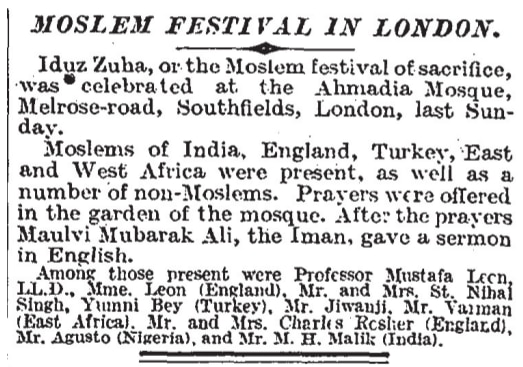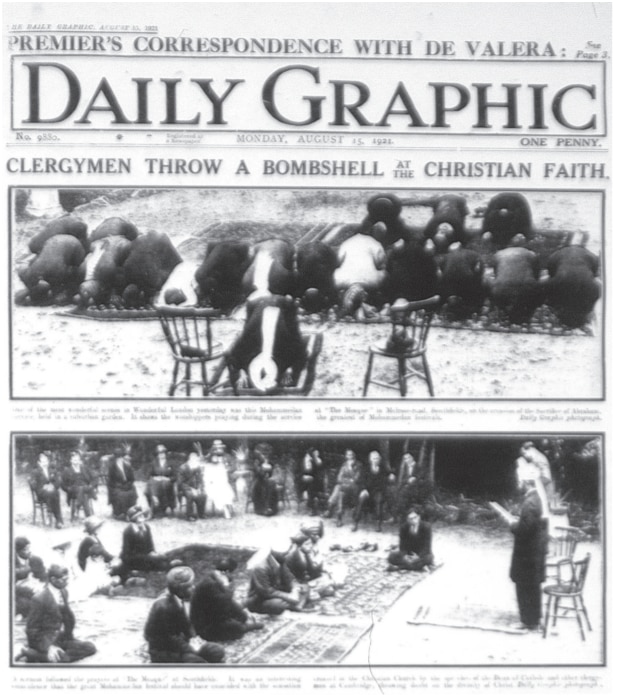Al Fazl, 26 and 29 September 1921
Eid-ul-Adha of Ahmadis in London
Sitting in the darkness of enmity and hatred, it has been reported by the Paigham newspaper that “there was not a single English new convert Muslim, man or woman” among those who offered Eid in the garden at Southfields. However, The Times, London’s highly reputable daily newspaper, in its issue of 17 August 1921, referring to the Ahmadiyya Mission in London, under the heading, “The Islamic Festival in London”, writes:
“Iduz Zuha, or the Moslem festival of sacrifice, was celebrated at the Ahmadia Mosque, Melrose-road, Southfields, London, last Sunday.
“Moslems of India, England, Turkey, East and West Africa were present, as well as a number of non-Moslems. Prayers were offered in the garden of the mosque. After the prayers, Maulvi Mubarak Ali, the Imam, gave a sermon in English.
“Among those present were Professor Mustafa Leon, L.L.D., Mme. Leon (England), Mr. and Mrs. St. Nihal Singh, Yumni Bey (Turkey), Mr. Jiwanji, Mr. Varman (East Africa), Mr. and Mrs. Charles Rosher (England), Mr. Agusto (Nigeria), and Mr. M. H. Malik (India).”

After presenting the above lines [from The Times], we leave it to the readers to decide whether the London Times’ report is correct or that of the Lahori Paigham. […]
The Paighami preacher’s level of honesty
In this [29 September 1921] issue of our newspaper, there is mention of those speeches that were made against the divinity of Jesus by priests. These speeches were delivered in the churches of London on Sunday, 14 August [1921]. Coincidentally, the ceremony of Eid-ul-Adha happened to be on the same day.
The Daily Graphic newspaper published a picture of the occasion of Eid prayer along with the listeners of the sermon at the Ahmadiyya mosque in London on one side and a picture of people leaving the church on the other side and wrote:

“It was an interesting coincidence that the great Muhammadan festival should have coincided with the sensation created in the Christian Church by the speeches of the Dean of Carlyle and other clergymen at Cambridge, throwing doubt on the divinity of Christ.”
The Paighami preacher, Mian Dost Muhammad, has surprisingly attributed the above words of The Daily Graphic newspaper to the Eid ceremonies held at Woking. In his article published in the newspaper Wakil, 23 September [1921], he first writes:
“On 14 August [1921], it was the occasion of Eid-ul-Adha that was celebrated as usual in the Woking Mosque.”
He then goes on to write:
“It has been mentioned above [i.e. in his article] that the day the Dean of Carlyle’s speech was being criticised in the churches was the same day that the Muslims celebrated the Eid festival. The Daily Graphic newspaper has published a picture of the Muslims’ Eid [festival] and the picture of churchgoers side by side.”
However, the said picture published by The Daily Graphic is not that of Woking, but in fact, it clearly contains the following words below it:
“A sermon followed the prayers at ‘the mosque’ at Southfields.”
The Paighami preacher completely omitted the said words and translated the rest of the text and attributed the words of The Daily Graphic to themselves. He may have thought that the said newspaper would not go to India and so no one would become aware of this misinformation.
Although this is a trivial matter, where it sheds light on the level of honesty and integrity of a person working as a missionary [for Woking mission], it is also clear that the enmity of the said people against the Ahmadiyya Jamaat has reached a very low point. Apart from repeating the words of others about our mission, they have gone on to attribute them to themselves.
In contrast to them, have a look at our conduct. In the previous issue [of Al Fazl], the article that was published with the extracts of The Daily Graphic contained a sentence about Lord Headley. We translated it as it is [into Urdu]. However, it had nothing to do with the actual subject of the said article and if it had been omitted, there would have been no defect in the coherence of the article. May Allah make it so that these people learn to act fairly and honestly when it comes to our [Jamaat].
(Translated by Al Hakam from the original Urdu in the 26 and 29 September 1921 issue of Al Fazl)

